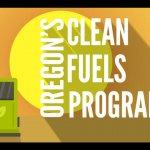transforming transportation: working together to accelerate electrification
Cutting down diesel pollution not only improves human health and mitigates climate impact, it also keeps our money local and creates new jobs.
On July 10th, Governor Brown signed on to a memorandum of understanding with governors of 14 other states, committing to work together to accelerate the electrification of medium and heavy duty trucks.
This is just the beginning of an important push to make sure that the heavy trucks driving through our communities get cleaner as fast as possible. These vehicles- box trucks, trash trucks, trailer trucks, school buses, and more – are responsible for nearly a quarter of transportation greenhouse gas emissions, which is the biggest source of climate pollution in Oregon, and rising.
Diesel exhaust from these vehicles is carcinogenic and causes other health effects including premature death, hospitalizations and emergency department visits for exacerbated chronic heart and lung disease.
Oregon Environmental Council(OEC) has been working for years to get these toxics out of our neighborhoods and eliminate the impact of these heavy vehicles on our climate.
We’ve made great progress, but there is still a lot of work to be done. In 2021, the Department of Environmental Quality, responding to the governor’s direction to take action on climate change, will begin rulemaking to adopt California’s emission standards and require manufacturers to produce zero-emission trucks.
This will help Oregon keep up with California’s standards and avoid becoming a dumping ground for dirty trucks, and expand the production of clean trucks.
We will be tracking the rulemaking; stay tuned for updates about opportunities to make your voice heard in the process!











